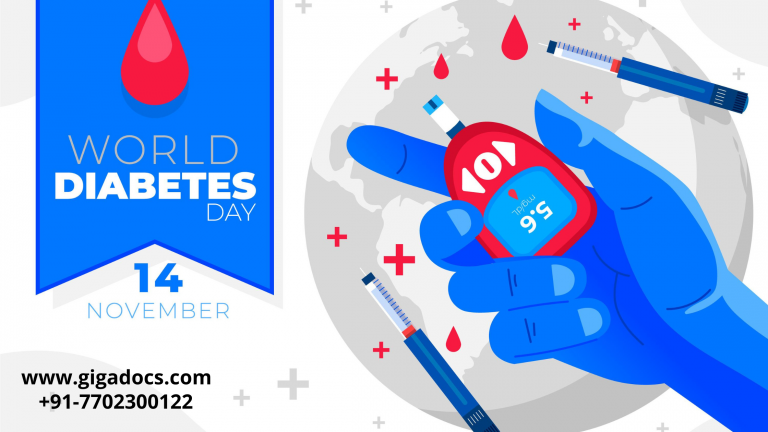This week we celebrate Children’s Day, World Diabetes Day on November 14th, and World Prematurity Day on November 17th. Amidst all the celebrations this week, let us raise awareness of the global challenges and burden of premature birth and learn more about how children are affected by Diabetes. Before we start, do you know while premature birth occurs before 37 weeks of pregnancy, over 1 million children and adolescents (20 years) worldwide have type 1 diabetes?
Let us learn more about World Diabetes Day and how it affects children-
Children and Diabetes
Type 1 Diabetes-
Type 1 diabetes develops in children when the body no longer produces insulin. A child’s diagnosis of type 1 diabetes can be frightening, especially at first. These children need an insulin pump or injections to replace natural insulin.
Type 1 diabetes is also known as juvenile diabetes or insulin-dependent diabetes in children. The signs and symptoms of type 1 diabetes usually appear quickly. They may include bedwetting in a toilet-trained child, excessive thirst, frequent urination, fatigue, irritability, behavioral changes and extreme hunger, and unintentional weight loss. Another thing you need to learn as a parent being depending on your child’s age, you and your child will have to learn how to monitor blood sugar, administer injections, and count carbohydrate.
Type 2 Diabetes-
Type 2 diabetes is a chronic disease that affects how your child’s body uses sugar (glucose) for fuel. Without treatment, the disorder causes blood sugar levels to rise, leading to serious implications.
The growing number of obese children has increased type 2 diabetes cases in children who need to be physically active to use less insulin to lower their blood sugar levels. You have many options for helping your child manage or prevent type 2 diabetes. Encourage your child to exercise regularly, maintain a healthy weight and eat healthy foods. Insulin treatment or oral medication may be required when exercise and healthy eating are insufficient to control type 2 diabetes.
Let us learn about the factors that cause diabetes in children and how to manage it-
Diabetes in Children: What Causes It?
Diabetes is an autoimmune disorder destroying insulin-producing cells in the body’s immune system. Young children with type 1 diabetes need daily insulin injections to meet their body insulin needs.
Diabetes Management Strategy
No two children manage their diabetes in the same way. We recommend that you schedule an appointment with a Pediatric Endocrinologist to develop your child’s personalized Diabetes Medical Management Plan (DMMP). Then, go to the school along with the DMMP to discuss with your child’s school principal, nurse, nutrition specialist, teachers, and other staff who may be in charge of your child during the day and after school.
The DMMP covers every aspect of diabetes management and treatment, including:
- Use of insulin or other medications.
- Plans for meals and snacks, including special events.
- Target blood sugar range and whether or not your child requires assistance checking their blood sugar.
- The symptoms of your child’s low blood sugar (hypoglycemia) or high blood sugar (hyperglycemia) and how to treat blood sugar.
- How to Manage Sports and Physical Activity.
The DMMP we discussed is designed to work with your child’s daily needs and routine. Make sure to update it once a year or more frequently if your child’s treatment changes.
Treating Low Blood Sugar
Low blood sugar can happen quickly and must be treated immediately, especially if the child is at school. It is most commonly caused by having too much insulin, waiting too long for a meal or snack, not eating enough, or not getting enough physical activity. Because the symptoms of low blood sugar vary, school personnel should be familiar with your child’s specific symptoms (DMMP will help here). Signs may include nervousness or anxiety, irritability or impatience, shakiness, sweating, chills, dizziness, blurred vision, hunger or nausea, difficulty concentrating, anger, stubbornness, sadness, and weakness or fatigue.
Check that your child has received all recommended vaccinations, including the flu shot. Diabetes can make children sicker and keep them unwell for longer. Being sick can cause blood sugar monitoring more difficult. Hand washing, especially before eating and after using the restroom, is one of the best ways to avoid getting sick and spreading germs to others.
Diagnosis of Pediatric Diabetes with Gigadocs
Blood tests for type 1 diabetes in children include the Random blood sugar test, Glycated hemoglobin (A1C) test, and Fasting blood sugar test. Does your child exhibit the same symptoms as those listed above? Wait no longer; contact Gigadocs today to schedule a screening test and expert consultation for your child.
To book, Download the App from-
- IOS App – apple.co/2W2iG4V
- Android App – bit.ly/33AQoRC
To know more e-mail, at info@gigadocs.com




